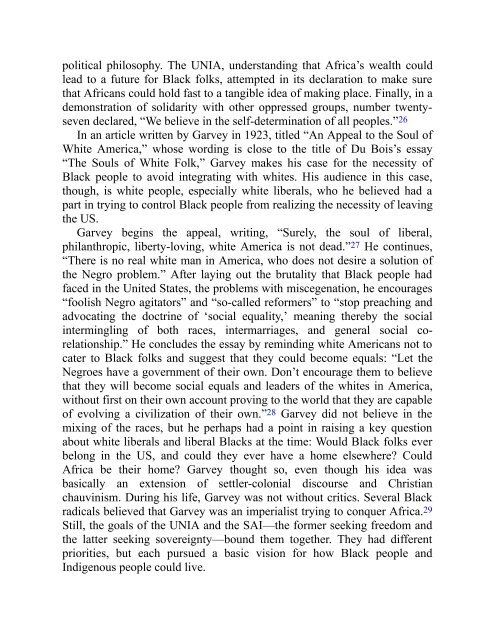You also want an ePaper? Increase the reach of your titles
YUMPU automatically turns print PDFs into web optimized ePapers that Google loves.
political philosophy. The UNIA, understanding that Africa’s wealth could<br />
lead to a future for Black folks, attempted in its declaration to make sure<br />
that Africans could hold fast to a tangible idea <strong>of</strong> making place. Finally, in a<br />
demonstration <strong>of</strong> solidarity with o<strong>the</strong>r oppressed groups, number twentyseven<br />
declared, “We believe in <strong>the</strong> self-determination <strong>of</strong> all peoples.” 26<br />
In an article written by Garvey in 1923, titled “<strong>An</strong> Appeal to <strong>the</strong> Soul <strong>of</strong><br />
White America,” whose wording is close to <strong>the</strong> title <strong>of</strong> Du Bois’s essay<br />
“The Souls <strong>of</strong> White Folk,” Garvey makes his case for <strong>the</strong> necessity <strong>of</strong><br />
Black people to avoid integrating with whites. His audience in this case,<br />
though, is white people, especially white liberals, who he believed had a<br />
part in trying to control Black people from realizing <strong>the</strong> necessity <strong>of</strong> leaving<br />
<strong>the</strong> US.<br />
Garvey begins <strong>the</strong> appeal, writing, “Surely, <strong>the</strong> soul <strong>of</strong> liberal,<br />
philanthropic, liberty-loving, white America is not dead.” 27 He continues,<br />
“There is no real white man in America, who does not desire a solution <strong>of</strong><br />
<strong>the</strong> Negro problem.” After laying out <strong>the</strong> brutality that Black people had<br />
faced in <strong>the</strong> <strong>United</strong> <strong>States</strong>, <strong>the</strong> problems with miscegenation, he encourages<br />
“foolish Negro agitators” and “so-called reformers” to “stop preaching and<br />
advocating <strong>the</strong> doctrine <strong>of</strong> ‘social equality,’ meaning <strong>the</strong>reby <strong>the</strong> social<br />
intermingling <strong>of</strong> both races, intermarriages, and general social corelationship.”<br />
He concludes <strong>the</strong> essay by reminding white Americans not to<br />
cater to Black folks and suggest that <strong>the</strong>y could become equals: “Let <strong>the</strong><br />
Negroes have a government <strong>of</strong> <strong>the</strong>ir own. Don’t encourage <strong>the</strong>m to believe<br />
that <strong>the</strong>y will become social equals and leaders <strong>of</strong> <strong>the</strong> whites in America,<br />
without first on <strong>the</strong>ir own account proving to <strong>the</strong> world that <strong>the</strong>y are capable<br />
<strong>of</strong> evolving a civilization <strong>of</strong> <strong>the</strong>ir own.” 28 Garvey did not believe in <strong>the</strong><br />
mixing <strong>of</strong> <strong>the</strong> races, but he perhaps had a point in raising a key question<br />
about white liberals and liberal Blacks at <strong>the</strong> time: Would Black folks ever<br />
belong in <strong>the</strong> US, and could <strong>the</strong>y ever have a home elsewhere? Could<br />
Africa be <strong>the</strong>ir home? Garvey thought so, even though his idea was<br />
basically an extension <strong>of</strong> settler-colonial discourse and Christian<br />
chauvinism. During his life, Garvey was not without critics. Several Black<br />
radicals believed that Garvey was an imperialist trying to conquer Africa. 29<br />
Still, <strong>the</strong> goals <strong>of</strong> <strong>the</strong> UNIA and <strong>the</strong> SAI—<strong>the</strong> former seeking freedom and<br />
<strong>the</strong> latter seeking sovereignty—bound <strong>the</strong>m toge<strong>the</strong>r. They had different<br />
priorities, but each pursued a basic vision for how Black people and<br />
<strong>Indigenous</strong> people could live.


















